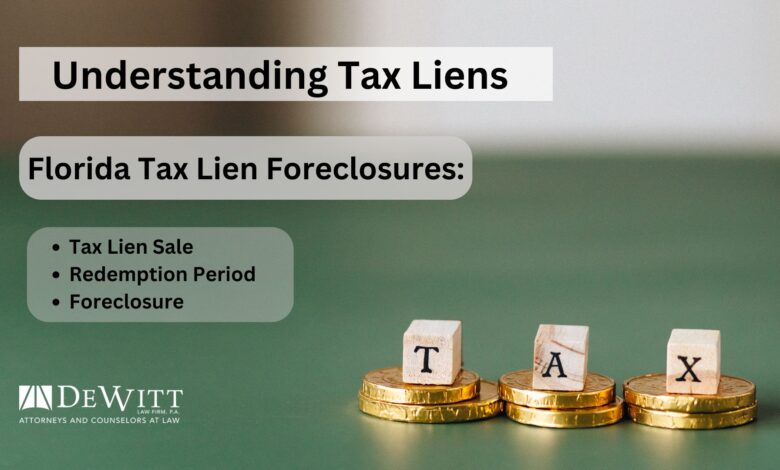How to Profit from Tax Liens in Florida: A Beginner’s Guide
How to Profit from Tax Liens in Florida: A Beginner’s Guide

1. Introduction
Definition of Tax Liens A tax lien is a legal claim imposed by a government entity on a property when the owner fails to pay the owed property taxes. This lien ensures the government’s interest in the property until the tax debt is settled.
Importance of Understanding Tax Liens Investing in tax liens can be highly profitable, offering substantial returns with relatively low risks when done correctly. However, understanding the complexities and legalities involved is crucial for any investor to succeed in this niche market.
Overview of the Process in Florida Florida provides a structured and transparent process for purchasing tax liens, making it an attractive state for investors. From online auctions to redemption periods, knowing the specifics of how tax liens in Florida work is the first step toward profitable investments.
2. Understanding Tax Liens in Florida
What is a Tax Lien? A tax lien represents the amount of unpaid property taxes owed to the local government. When these taxes remain unpaid, the government can sell the lien to investors to recoup the lost revenue.
How Tax Liens Work Investors purchase tax liens at auctions, paying the outstanding taxes on behalf of the property owner. In return, they receive interest on their investment when the owner repays the lien, or they may eventually foreclose on the property if the lien remains unpaid.
Difference Between Tax Liens and Tax Deeds While a tax lien involves purchasing the debt on a property, a tax deed means buying the property outright at auction. Understanding the differences between tax liens and tax deeds is critical for choosing the right investment strategy.
3. The Legal Framework
Relevant Florida Laws and Regulations Florida law outlines specific procedures and regulations governing tax lien sales. Familiarizing yourself with these laws, including Chapter 197 of the Florida Statutes, is essential for legal compliance and successful investing.
Role of the County Tax Collector The county tax collector plays a pivotal role in the tax lien process, managing the auction, collecting payments, and overseeing the redemption process. Knowing how to interact with and utilize the resources provided by the tax collector’s office can streamline your investment activities.
Legal Rights of Property Owners Property owners have certain rights, including redemption periods during which they can repay the lien and retain ownership. Understanding these rights helps investors navigate the redemption and foreclosure processes effectively.
4. Why Invest in Tax Liens?
Potential Returns on Investment One of the primary attractions of investing in tax liens is the potential for high returns. Interest rates on tax liens in Florida can be as high as 18% per year, providing a lucrative opportunity for investors.
Risks and Rewards While the rewards can be substantial, there are risks involved, such as the potential for properties to have other liens or legal issues. Balancing the risks and rewards is key to making informed investment decisions.
Comparison with Other Investment Types Compared to stocks, real estate, and other traditional investments, tax liens offer a unique balance of high returns and relatively low risk. However, they require specific knowledge and due diligence to be successful.
5. Getting Started with Tax Lien Investing
Research and Education Before diving into tax lien investing, thorough research and education are necessary. Numerous online resources, courses, and books can provide valuable insights into the intricacies of this investment strategy.
Financial Requirements Investing in tax liens in Florida requires capital, but the amount can vary widely depending on the properties and liens available. Understanding the financial requirements and setting a budget is crucial for new investors.
Choosing the Right Counties Not all counties offer the same opportunities for tax lien investing. Factors such as the frequency of auctions, types of properties available, and historical returns should guide your choice of counties.
6. Finding Tax Lien Properties
How to Access Tax Lien Listings tax liens in Florida listings are typically available through county tax collector websites and online auction platforms. Regularly checking these sources ensures you stay updated on available liens.
Online Resources and Tools Several online tools and databases can help investors find and evaluate tax lien properties. These resources streamline the research process, making it easier to identify promising investment opportunities.
Attending Tax Lien Auctions Attending auctions, whether in-person or online, provides firsthand experience and the chance to network with other investors. Understanding the auction process is critical for successful bidding.
7. Evaluating Tax Lien Properties
Assessing Property Value Evaluating the underlying property’s value is a crucial step in tax liens in Florida investing. This includes considering the property’s location, condition, and market value.
Understanding Property Conditions Knowing the physical condition of a property helps assess the investment’s risk. Properties in poor condition may require significant repairs, affecting their profitability.
Checking for Additional Liens or Issues Properties can have multiple liens or legal issues that complicate investments. Thoroughly researching the property’s title and history helps avoid costly surprises.
8. The Bidding Process
How Bidding Works at Auctions Understanding the mechanics of the bidding process at tax liens in Florida auctions is essential. This includes knowing the starting bid, bid increments, and the maximum bid you are willing to place.
Strategies for Successful Bidding Successful bidding strategies involve setting a budget, sticking to it, and knowing when to walk away. Experienced investors often have specific tactics to outbid competitors without overpaying.
Tips for First-Time Bidders First-time bidders should start small, attend multiple auctions to gain experience, and network with seasoned investors for insights and advice.
9. Winning the Bid
Steps to Take After Winning After winning a bid, promptly completing the necessary documentation and payment is critical. This ensures you legally secure the lien and begin the redemption or foreclosure process.
Documentation and Payment Proper documentation, including proof of payment and lien certificates, is essential for tracking your investment and claiming returns.
Important Deadlines to Remember Each stage of the tax lien process has specific deadlines, from paying for the lien to initiating foreclosure. Keeping track of these deadlines prevents legal issues and financial losses.
10. Managing Your Investment
Monitoring Tax Lien Properties Regularly monitoring the status of your tax lien properties helps ensure timely responses to redemptions or foreclosures. This includes tracking payment schedules and property conditions.
Communicating with Property Owners Effective communication with property owners can facilitate smooth redemptions. Being respectful and understanding can often lead to quicker and more amicable resolutions.
Handling Redemption and Foreclosure Knowing how to handle both redemption and foreclosure processes is essential. This includes understanding the legal steps and requirements for each scenario.
11. Redeeming a Tax Lien
What Happens When a Lien is Redeemed? When a property owner redeems a lien, they repay the outstanding taxes plus interest. Investors receive their initial investment plus the interest, resulting in a profit.
Calculating Your Returns Calculating returns involves considering the interest rate, redemption period, and any additional costs incurred. Accurate calculations ensure you understand your profits.
Documenting the Redemption Process Proper documentation of the redemption process ensures transparency and legal compliance. This includes keeping records of payments received and communicating with property owners.
12. Foreclosure Process
When and How to Start Foreclosure If a property owner fails to redeem the lien, investors can initiate foreclosure. Knowing when and how to start this process is crucial for taking possession of the property.
Legal Considerations Foreclosure involves complex legal considerations, including notifying the property owner and following state-specific procedures. Legal advice may be necessary to navigate this process.
Steps to Take Possession of the Property Successfully foreclosing on a property requires completing several legal steps, from filing necessary paperwork to obtaining a deed. Understanding these steps ensures a smooth transition of ownership.
13. Selling or Holding the Property
Deciding Whether to Sell or Hold Deciding whether to sell or hold a foreclosed property depends on market conditions, property value, and your investment goals. Each option has its advantages and disadvantages.
Preparing the Property for Sale If you decide to sell, preparing the property involves repairs, staging, and marketing. Investing in these areas can significantly increase the property’s sale price.
Marketing and Selling Strategies Effective marketing and selling strategies include listing the property on multiple platforms, highlighting its features, and setting a competitive price. Engaging with real estate agents can also facilitate quicker sales.
14. Common Pitfalls and How to Avoid Them
Common Mistakes Made by Beginners Beginners often make mistakes such as overbidding, neglecting due diligence, and underestimating property repair costs. Learning from these mistakes helps improve investment outcomes.
How to Mitigate Risks Mitigating risks involves thorough research, setting realistic budgets, and seeking advice from experienced investors. Diversifying investments can also spread and reduce risk.
Lessons Learned from Experienced Investors Experienced investors offer valuable lessons, such as the importance of patience, continuous learning, and adapting strategies based on market conditions. Their insights can guide new investors toward success.
15. Tax Implications
Understanding Tax Liabilities Understanding the tax liabilities associated with tax lien investments is crucial. This includes knowing how to report income and any applicable tax deductions.
Reporting Income from tax liens in Florida Income from tax liens must be reported on your tax returns. Keeping accurate records of all transactions ensures compliance with tax laws.
Tax Deductions and Benefits Investors may be eligible for various tax deductions and benefits. Consulting with a tax professional can help identify and maximize these opportunities.
16. Success Stories
Case Studies of Successful Investors Real-life case studies provide insights into successful strategies and common challenges. Learning from these examples can inspire and guide new investors.
Personal Stories and Insights Hearing personal stories from other investors can provide motivation and practical tips. These stories highlight the real-world implications of tax lien investing.
Key Takeaways from Real Experiences Key takeaways from experienced investors include the importance of due diligence, patience, and continuous learning. Applying these lessons can improve your investment success.
17. Expert Tips and Advice
Quotes from Industry Experts Industry experts offer valuable quotes and advice on successful tax lien investing. Their insights can help refine your strategies and improve your outcomes.
Recommended Best Practices Best practices include conducting thorough research, attending multiple auctions, and maintaining accurate records. Following these practices helps ensure successful investments.
Resources for Further Learning Numerous resources are available for further learning, including books, online courses, and seminars. Investing in your education is key to long-term success.
18. FAQs
Common Questions About tax liens in Florida Investing
- What are tax liens and how do they work?
- How do I start investing in tax liens?
- What are the risks involved?
Detailed Answers and Explanations Providing detailed answers to common questions helps clarify the tax lien investment process and address potential concerns.
Additional Resources and Links Including additional resources and links to reputable websites offers readers further information and guidance.
19. Conclusion
Recap of Key Points Summarizing the key points reinforces the essential information covered in the article, helping readers retain the most important insights.
Encouragement to Start Investing Encouraging readers to start investing in tax liens emphasizes the potential benefits and opportunities available in this market.
Final Thoughts and Next Steps Offering final thoughts and outlining next steps provides readers with a clear path forward, encouraging them to take action and start their investment journey



